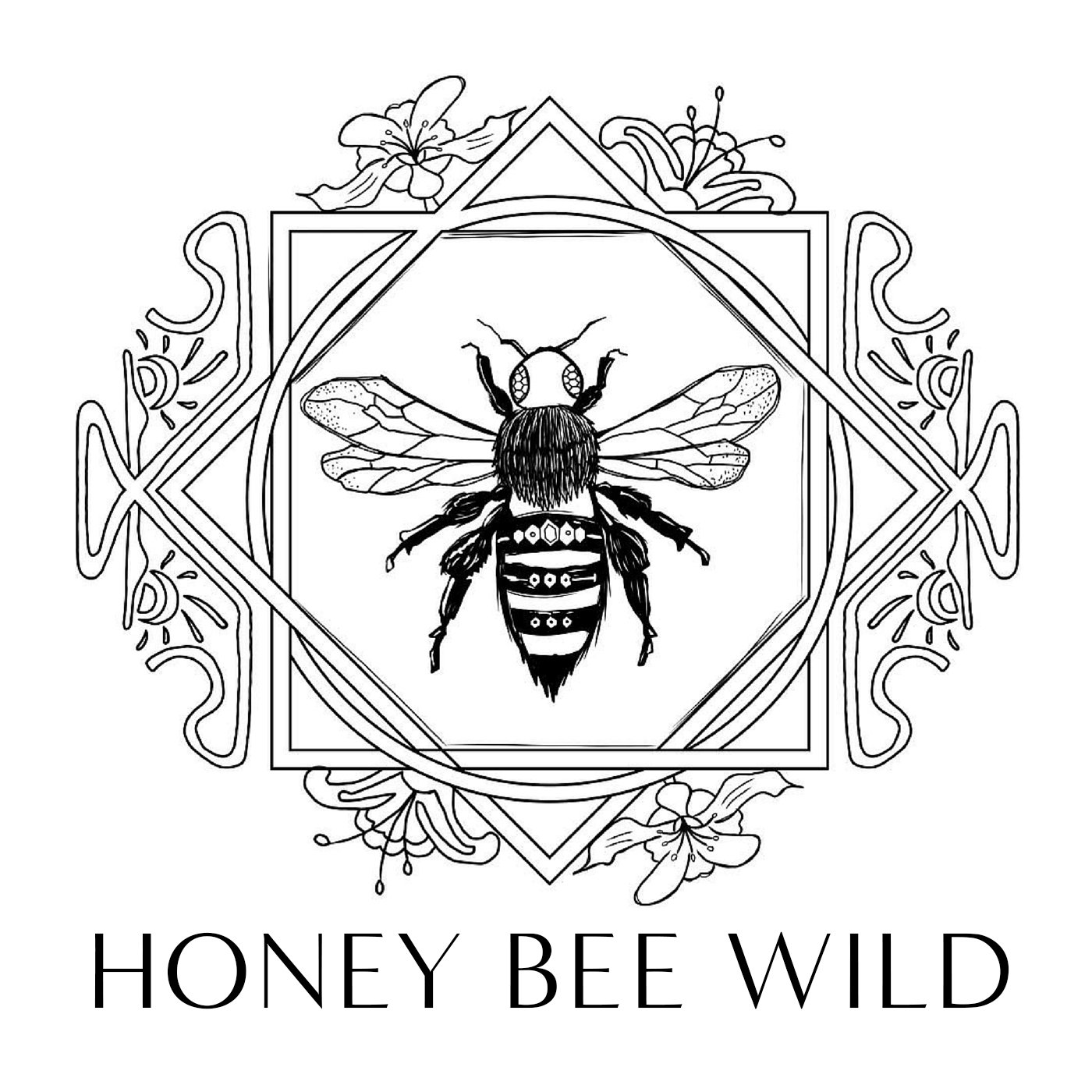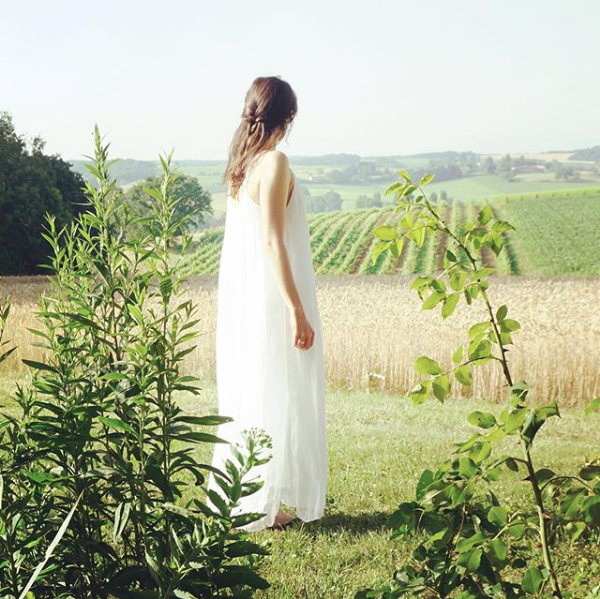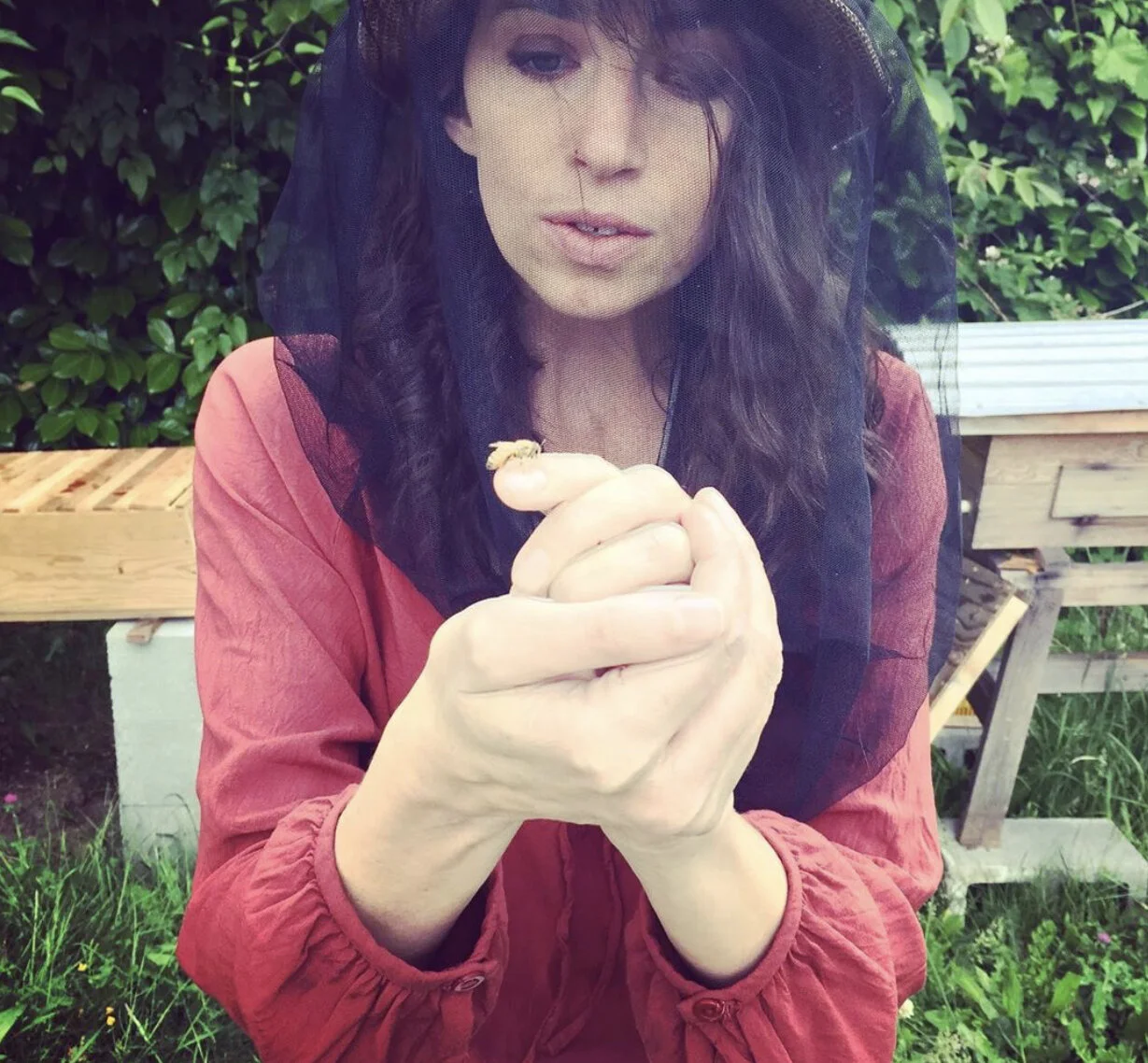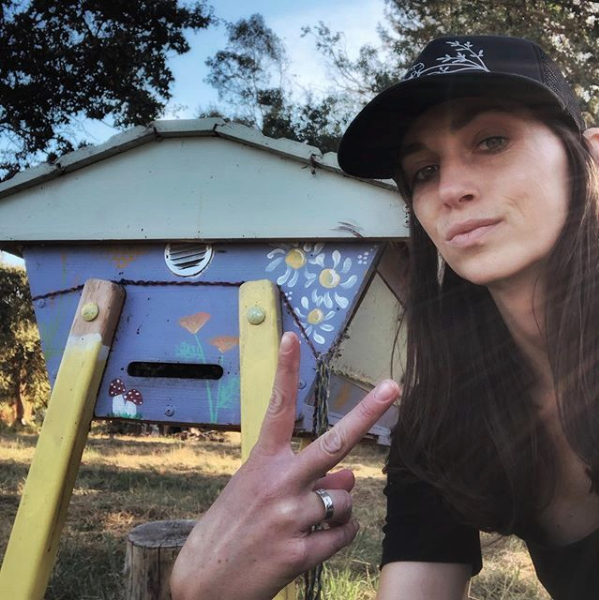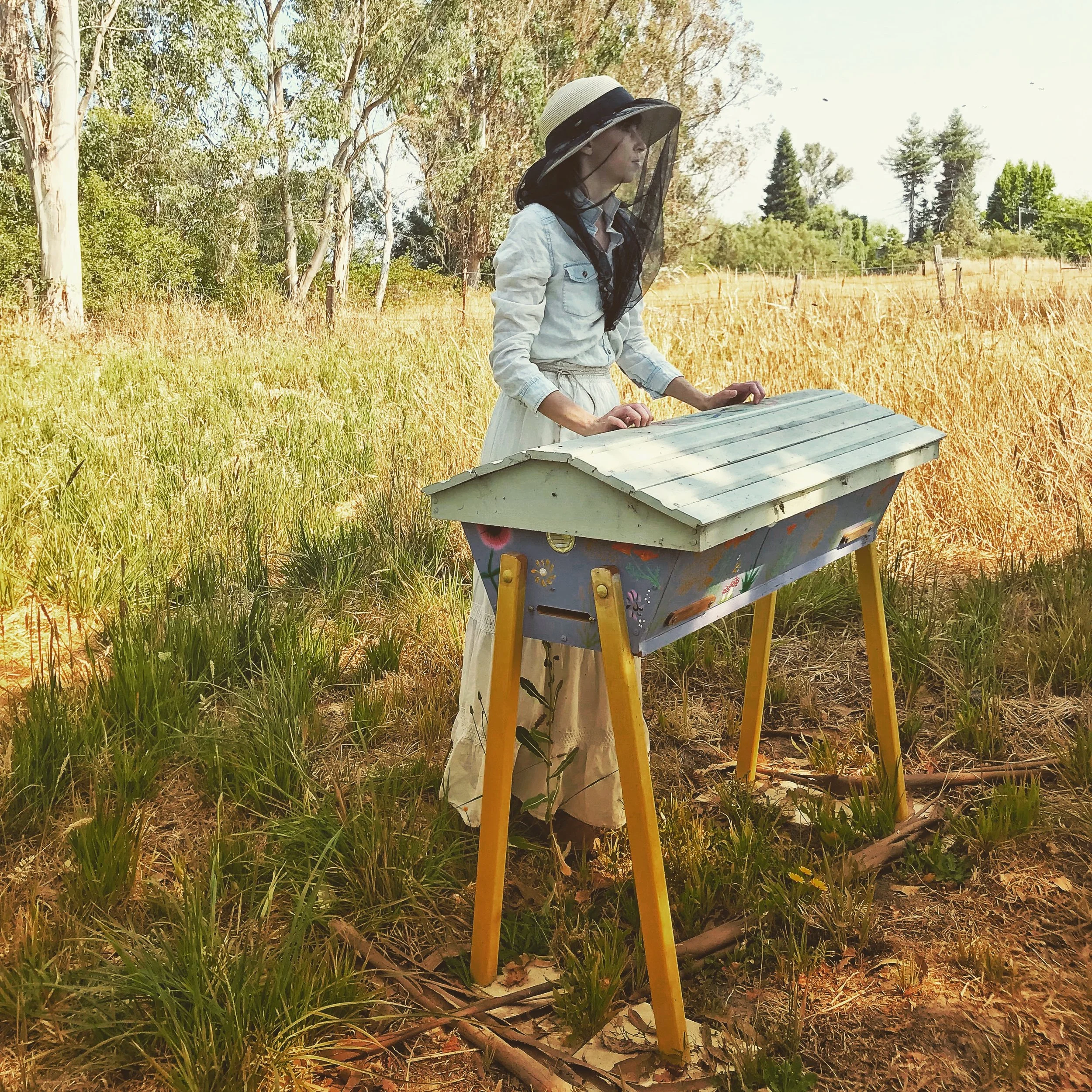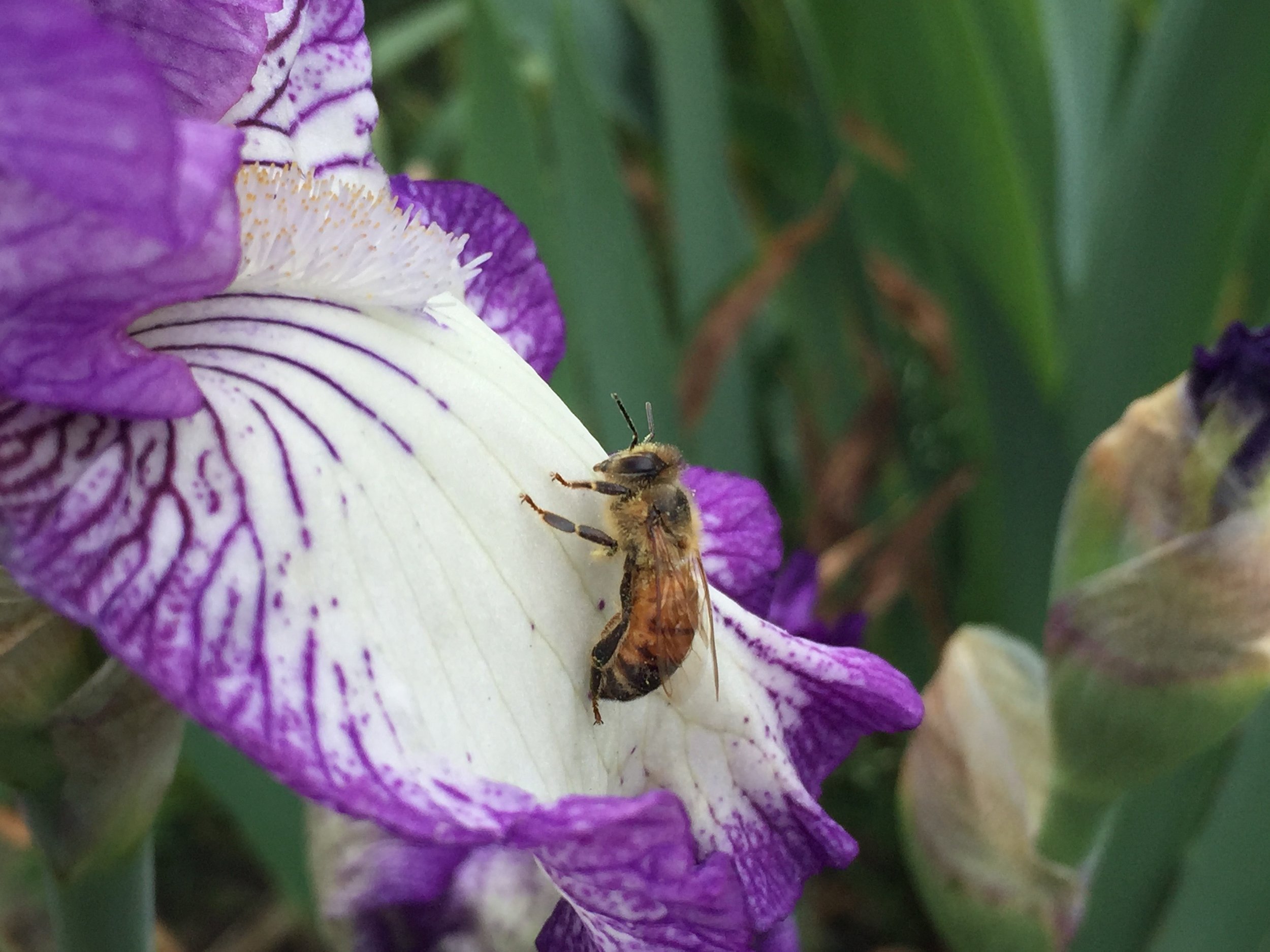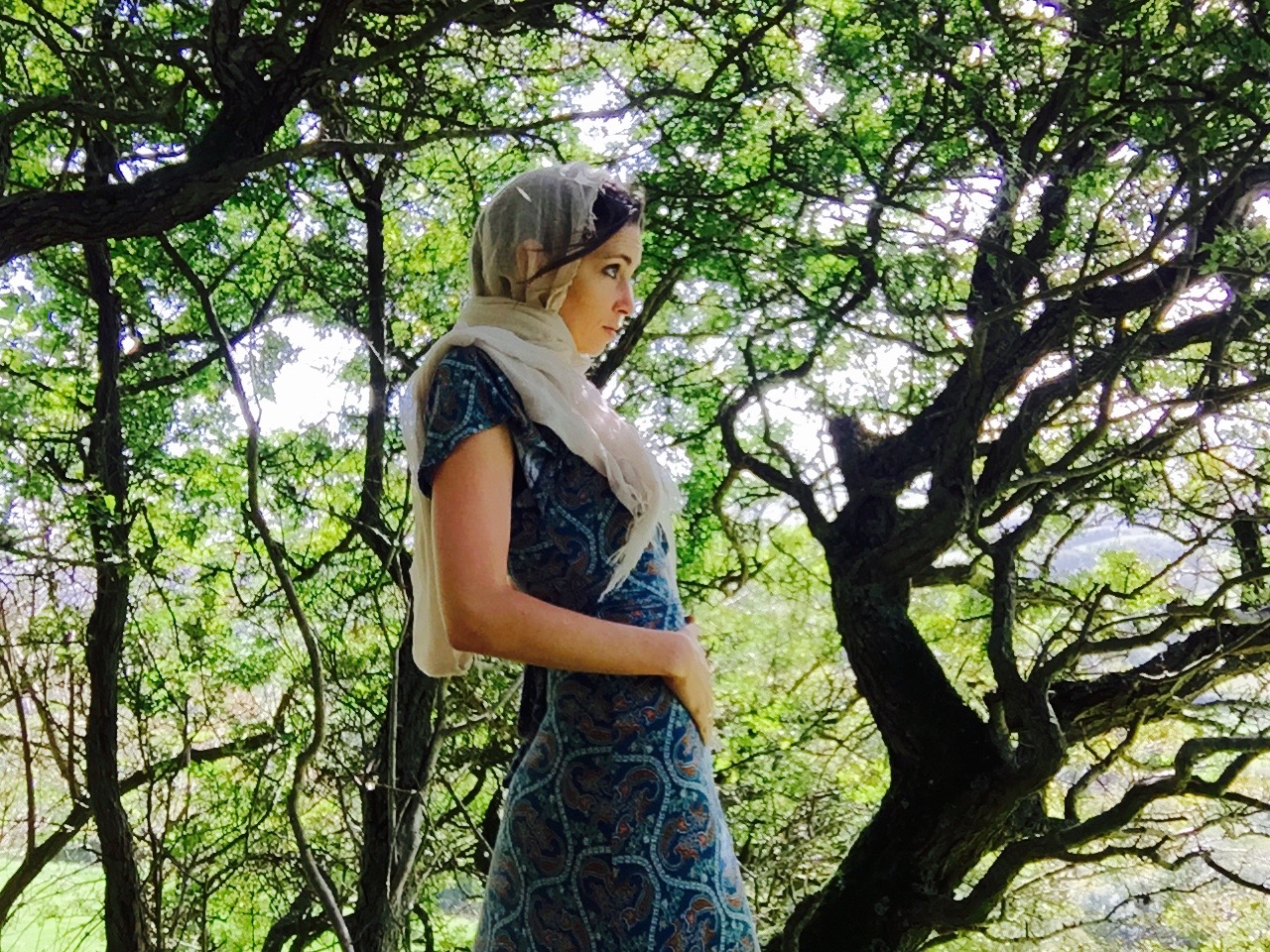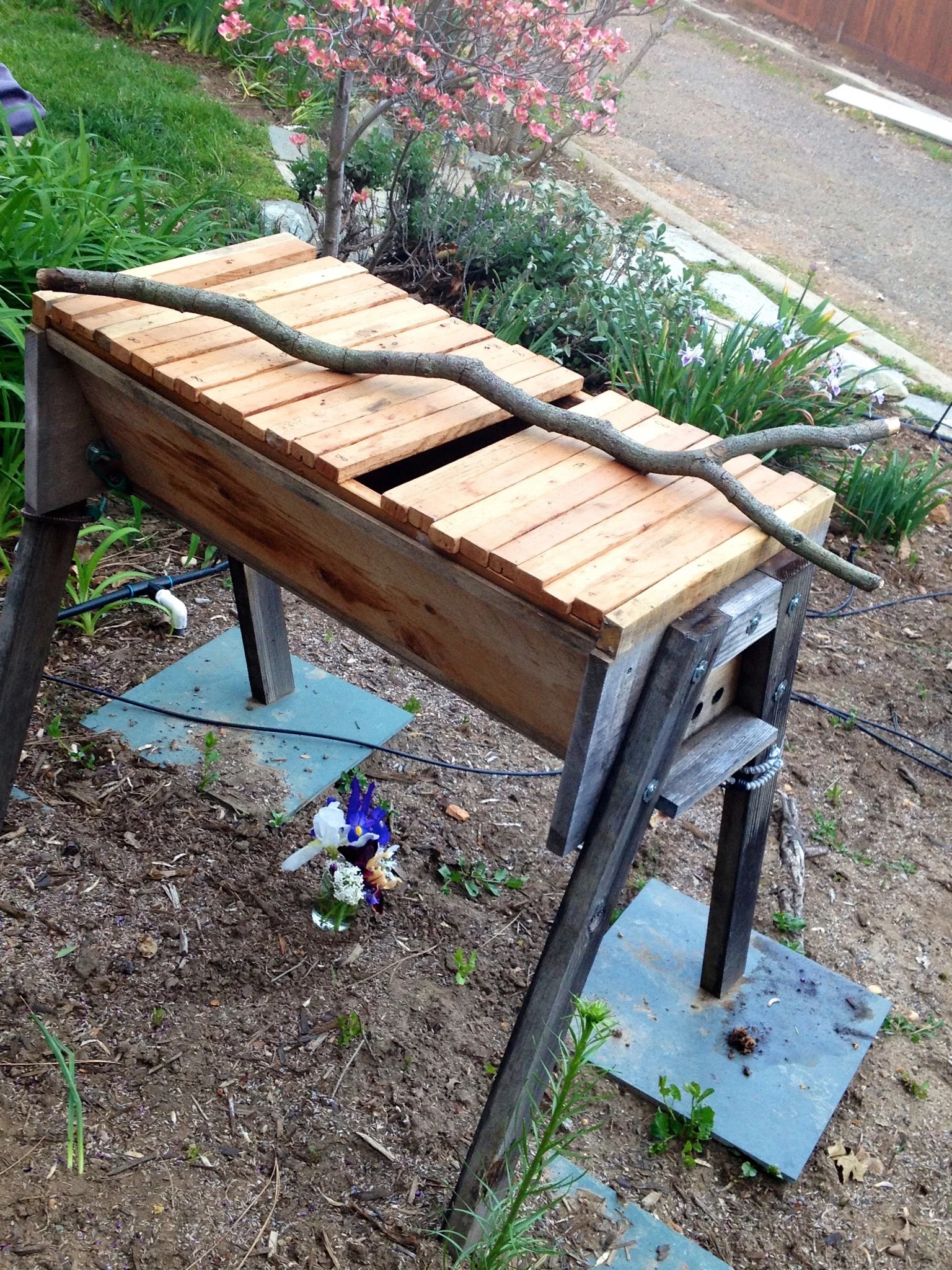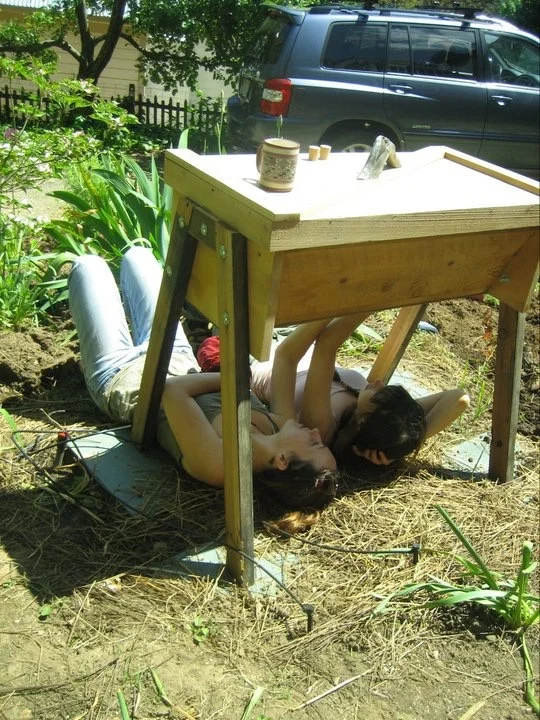Business Tips: How to go From Zero to Campfire Coffee in a Few Decades
I’ve been in a big renegotiation about my relationship to work. I took this December off from classes and clients because I didn’t really get a maternity leave when my daughter was born. I worked all days and all hours throughout my entire pregnancy.
I’ve been in a big renegotiation about my relationship to work. I’m coming out of my second maternity leave with a bang, and it’s a little jarring. I worked all days and all hours throughout my entire pregnancy. For those of you that don’t know, I’m a single mom who made the choice to become a parent on my own, after years of waiting for a partner. I knew I needed to figure out a work situation that allowed me to stay home as a single nursing mother, and 6 years ago I started planning.
In 2104, after 4 years of beekeeping, Honey Bee Wild was formed. It would become the vehicle through which this pregnancy felt possible. I got very good at being proud of my work ethic. Hustling. Juggling. Getting things done. Octopus-arms-for-brain. I was usually up till midnight working. Didn’t really know how to schedule my life, or really take a break.
I have never really been secure around finances. My sense of confidence in my income was emotionally and physically wobbly to say the least. For most of my adult life I worked multiple service industry jobs (restaurants, coffee shops, tasting rooms), and offered services like piano lessons, admin assistance, tarot card readings. I’ve always lived paycheck to paycheck. That’s not to say I haven’t had my foray into wild ventures. Did you know I spent a year as a chef and owner of my own Crepe stand? I spent another year running deluxe river cruises in Europe. And I worked in the office of a predatory “spiritual” author. I searched for my career for a LONG time. Meanwhile I was searching for my partner so I could 1) love him 2) start a family. This was also taking a reaaaaaaaaal long time and involved everything from ceremonies, to dating apps, to flights across the globe.
Lots of ergonomically poor decisions while baby slept.
When I mentally separated the need for a life partner from the ability to have a child in 2016 (it happened all at once during a Joanna Newsom concert), I pivoted my life toward building a business that could support me as a single parent.
I moved from Portland to Sonoma County. I took part time restaurant jobs so I could build my business from home all day, and work in the restaurant industry at night to pay my bills. I learned how to design my own website. I became a virtual assistant so I could refine the skills needed to run a business. I spent my money on beekeeping equipment and trips to England to study a small shamanic tradition connected to bees. I treated my studies overseas like a masters degree: they were for personal growth, true, but they were also the investment I was making in my future career.
In 2017 I made a commitment to be out of the restaurant industry by 2019. In October 2019 I jumped into running my business full time. In 2020 I found a donor, got pregnant, agonized over the pandemic like the rest of you, and worked worked worked. My business had its best year ever. In 2021 I had a baby. I ran my business from my phone while nursing. I got hired to teach a program for the Shift Network, which was incredible but absolutely dominated my early postpartum experience (hence second maternity leave). I hired an assistant, a nanny, a web designer, and a business coach. I took naps with my baby, I grieved friendships, I worked till midnight a lot of nights. When all was said and done, I stunningly doubled my income in a year. I didn’t go from 0-6 figures in 12 months like so many of the Instagram biz coaches talk about. I grew my business slowly, year by year, with a fuck-ton of intention and methodical planning. In 2021 I surpassed my financial goals.
I got out of debt. Let me say that again: I. GOT. OUT. OF. DEBT. Nineteen years of debt. I’m not sure if I can maintain the same income, but the year I gave birth, and ran my business for months from an iPhone while I nursed at 2am, while my insides turned outside, and my body, mind, and soul got permanently rearranged…THAT year was the year the benevolent spirit of my business spread her wings.
I remember when I was briefly connected to the 30-something crowd of coaches who all sold different variations of how to get from nothing to x figures in x amount of weeks/months. Really makes you question your turtle shell. But something about that always smelled off to me. The get rich quick model does work for some people, but it was never going to be my model. I like campfire coffee. You know, the kind where you wake up in the back country in the morning and even though your hands are frozen and you have the quick light stove right there. Even though you know you could have your cup in under ten minutes, you chose to gather the twigs, coax the small campfire into being, find the perfect rocks to balance the kettle, listen to the birds while it boils. Alright, I’ll admit, I’m super into someone else building the fire, and then crawling out of my sleeping bag, but then you miss the precious magic of first one awake with the wild.
Campfire and image by Rob Totoonchie - a damn fine back country fellow, photographer, and friend.
Campfire coffee is how I built my business. And the thing is, I don’t think my business would have allowed anything less. Honey Bee Wild is its own creature, and just like humans, it has it’s own divine timing. We forget that in the hustle market. And god do you have to hustle when Big Bro Capitalism, supported by patriarchy, Chistocentrism, and white supremacy is in charge of your rent, access to health care, student loans, etc. I digress.
I made campfire coffee, and it took a long time.
Last week I bought $600 worth of furniture to help baby proof the house: a nightstand, a cabinet, an ottoman, a shoe bench. I questioned every inch of those purchases, until I realized I am 40 and this was the first time I have ever bought a piece of furniture. I have often referred to my interior design as “college dorm” style, meaning any left over piece of furniture nobody wants I’d take. It was really damn nice to be able to buy a nightstand and say adios to this yard sale stool.
I don’t even know if I’ve “made it” or just had a really good year, but what I do know is that for the first time in my adult life, I’m not worried about how to pay my bills. Well, mostly not, bc my bills tripled with health insurance and child care now that I make more dollars (yes, I see you hamster wheel).
The point is, I didn’t know what to do with my life, or what career to have, or how I’d ever feel even a little bit financially secure. I’m not a one hit wonder. I don’t have a secret recipe to my success. I’m a single mom who kept one eye on the ground and one eye on the cosmos.
Now what? Do it all again. Rinse, repeat, and hope to stay afloat on the melting iceberg of our current reality? What I want is another month just to brainstorm. Candlelit dinners with friends. I want all these creative ideas inside to have room to bubble up. A year to write my book. I want to take an entire day off, and go to the beach with my daughter.
I am learning to exhale.
She May Not Behave Like You Expect
You may think you know her. You may have read about her behavior. You may have studied her. You may have experienced her habits. She may be nearly predictable. But, she may not behave like you expect. She is a Queen, after all.⠀
You may think you know her. You may have read about her behaviour. You may have studied her. You may have experienced her habits. She may be nearly predictable. But, she may not behave like you expect. She is a Queen, after all.⠀
This season I have had more encounters with queens than any before, and the great She is schooling me. We are taught to recognise a series of behaviours in animals, plants, earth and people. we learn to expect them. We greater knowers, like to know things. We like to predict. It makes us feel safe. It helps us steward. But the wild doesn’t read our textbooks or attend our webinars. We forget that each face we encounter, each bobcat, rowan tree, hummingbird, isn’t just an animal, they are a being with a personality, and personalities aren’t always predictable. ⠀
Life is wildly unpredictable. Our sunlight cultivation of order and neat little vegetable rows gets ruffled by errant vines and night visits by the deer people. But oh how we long to be among those unsettling antlered wanders. We know the swarm follows the queen and she hides deep within it, but oh how we long for that moment when she wades bravely along the outside edge. When she does not hide. She confounds us, but we long for a glimpse of her strange mystery.⠀
They say when you hive a swarm, the queen is in the heart of the cluster and stays protected deep inside the new colony. But yesterday she flew in the golden rays and landed on my finger. ⠀
They say a queen mates shortly after hatching, but I have witnessed her waiting weeks, remaining virginal and adored by her sisters. ⠀⠀
She is complex. She is a daughter of the sun and the moon. She yields and she takes no prisoners. She is a mother and a lover. She is discipline and chaos. ⠀
She gives me hope as I step down an unusual road to motherhood, weeping this week in joyous gratitude for the village of people supporting me (you!), while being absolutely brought to my knees in the heavy grief of longing for a partner.
The Queens. Our ladies of Sun and Shadow, they hold my spirit in their delicate ferocity. In their promise for life. They remind me: be wild, step bravely, let yourself be fed, wait for your time. Walk into motherhood with Her, and like her, be something you could never predict.
How to Keep Bees
How to keep bees:⠀
* Flirt with the sea⠀
How to keep bees:⠀
* Flirt with the sea⠀
* Look through old volumes of botanical illustrations⠀
* Read books by Sharon Blackie⠀
* Skinny dip at least once in a slightly risky location ⠀
* Question why it’s called the European or western honey bee when it originated in Africa.⠀
* Go to France. Or Nepal. Or whatever place is calling the soul of your imagination.⠀
* Giggle all by yourself.⠀
* Take a course in eco-psychology⠀
* Tell her how you feel.⠀
* Leave offerings for the trees.⠀
* Get stung.⠀
* Spend time playing make believe with a child⠀
* Teach yourself about what’s growing and blooming in your area. Eat from the lands closest to you.⠀
* Be seduced by flowers.⠀
* Watch Martin Shaw tell a story.⠀
* Ask the wild bee what the druid knows.⠀
* Drink sunlight, tickle starlight.⠀
* Get your hands dirty.⠀
* Talk to your ancestors.⠀
* Bathe your mind in propolis.⠀
* Be curious about the family of ducks at the park.
* Question definitions of gender.⠀
* Dress in your finest just to have a chat with the moon.⠀
* Light beeswax candles and read delicious fictions late into the night.⠀
* Tell him how you feel.⠀
* Protest with Greta.⠀
* Backpack at least once in the wilderness.⠀
* Let spirit take you.⠀
* Stay up all night dancing.⠀
* Let bees lick honey off your fingers.⠀
* Lick honey off your fingers.⠀
* Dive into the reverie. ⠀
You are the Bridge
Where did it begin? This love affair? This obsession? This reverence? Was it in our prehistoric ancestors, with fire in their hands, climbing the highest of heights to gain your nectar? Was it in the way your honey and pollen aided in the development of our ancient brains?
Where did it begin? This love affair? This obsession? This reverence? Was it in our prehistoric ancestors, with fire in their hands, climbing the highest of heights to gain your nectar? Was it in the way your honey and pollen aided in the development of our ancient brains?
Did it begin with those first altars of honey? With those myths of rivers filled with honey wine? With a white she-goat dripping mead? With the tree whose sap means honey and whose promise is life?
There is no tracing the origin of our courtship with the bee. Only honeyroads to follow into and out of antiquity. See the bee nymphs, dusted in pollen, who whispered the art of prophecy to the sun god. See the tears of Ra who fell to the earth and became bees. Christ's tears as well. Hear the hum on the lips of poets. Trace the sisterhood in asterisms. Taste the food of the gods. What about when we wised up? Got rid of all this pagan polytheism? Forgot the Queen of Heaven and chose one god. Did our obsession end? We took Her out of the picture, but did our fascination cease? Ask the priests who brought hives to the new world, because no Catholic mass could be held without holy beeswax candles. Ask the Christian family who brought cake to the bees after Christmas Eve mass. Ask the men of industry and innovation who sought to find a way to better manage this nest of divine beauty. Were they any less mesmerised than Aristotle? Hafiz? King Solomon?
Where has it gone to? This love affair?
Into the many rivers of the inquisitive religion of the modern era: science. That beautiful achievement of the honed intellect. Science, who's “authority has grown so immense over the centuries that it now claims supremacy over all other forms of thought.” (William J. Broad). A gift, this science. And a limitation, if it excludes the old memory of body, poetry, spirit and the ineffable.
What comes next in this love affair? What does the reawakened feminine bringing to the conversation? What happens when we weave centuries of honeyed wisdom with centuries of scientific progress. What else is possible? You are the bridge.
Hymenoptera: veil-winged
Hymenoptera: veil-winged. An order of insects including wasps, sawflies and honey bees, but particularly connected, linguistically, to the goddess culture at its ties to the honey bees. Hymen is derived from Greek and means “membrane” or “veil”. It denotes not only the veil within the virginal maiden, but also the veil draped before in innermost sanctum of the temple of the goddess. It also came to represent the veil between the outer world and the hidden inner world of women’s mysteries, both physically and spiritually.
Hymenoptera: veil-winged. An order of insects including wasps, sawflies and honey bees, but particularly connected, linguistically, to the goddess culture at its ties to the honey bees. Hymen is derived from Greek and means “membrane” or “veil”. It denotes not only the veil within the virginal maiden, but also the veil draped before in innermost sanctum of the temple of the goddess. It also came to represent the veil between the outer world and the hidden inner world of women’s mysteries, both physically and spiritually.
Honey bees are said to arrive with the heliacal rising of the seven sisters, or Pleiades, in the East every spring. Born of the constellation Taurus, the bull, the bees rise in the spring bringing life. The bull is an ancient symbol of the goddess and goddess culture. Through the union of the bees borne of the bull we receive the sustenance of life: milk and honey.
Mirrored in the stars, these seven celestial bees hold the story of the veiled one as well. With the suppression of the goddess culture many myths were rewritten. The seven sisters became seven daughters, one of whom was named Merope or “bee-eater”. She dared to love and wed a mortal and for this she was shamed, turning her face away and dimming her light in the night skies. While every Greek myth has many versions, it’s important to remember they all have threads running back to old memory and old ways that venerate the feminine instead of shame it. In another version these sisters are seven doves, like the doves or priestess that flew out of Africa and founded the three major oracular centers in the Ancient world, including Delphi, where the Delphi Bee gave oracle.
In some myths they were the nymphs of Artemis, who was deeply tied to the bee nymphs (melissae) and the guardian of the wild bees. And in still oldrer, obscure myths the stars were in fact, seven bees: six daughters and their queen, who remains veiled (hidden) in the inner sanctum of the temple of the bee.
Food for thought next time you don your bee veil to go whisper to the bees.
Imposter Syndrome
I have a few drums I beat in my cave of honey and hum. I beat the drum for natural beekeeping and bee sovereignty. I beat the drum for the womb-beat of the Earth. I beat the drum for the rise and integration of the feminine with all peoples, industries, and businesses. I beat the drum of dismantling the Patriarchy (that one is low and reverberating AF). And I beat the drum of calling for more women’s voices in beekeeping. I’m polyrhythmic.⠀⠀
Which is why I found it so fascinating when, whilst sounding the horns and ringing the bells for more women’s voices in the conversation on beekeeping, I blanched when asked to be one of them, on a stage. ⠀⠀
I have a few drums I beat in my cave of honey and hum. I beat the drum for natural beekeeping and bee sovereignty. I beat the drum for the womb-beat of the Earth. I beat the drum for the rise and integration of the feminine with all peoples, industries, and businesses. I beat the drum of dismantling the Patriarchy (that one is low and reverberating AF). And I beat the drum of calling for more women’s voices in beekeeping. I’m polyrhythmic.⠀⠀
Which is why I found it so fascinating when, whilst sounding the horns and ringing the bells for more women’s voices in the conversation on beekeeping, I blanched when asked to be one of them, on a stage. ⠀⠀
Recently I was asked to be a speaker at the Natural Beekeeping Conference. A place filled to the brim with people I admire. I said yes immediately. Did a jig. Thanked the goddesses and then freaked the eff out about “my topic”. Suddenly, I felt like an imposter. I began the good ol’ comparison game. I counted my years of “experience” on my fingers and asked “Do I measure up?” I counted my hives and asked “do I have enough?” I am not a scientist. I am not in charge of 100 hives. I am not published. ⠀⠀
I immediately questioned the importance of my voice in the narrative of beekeeping. Here’s the catch, the wonderful folks at the conference aren’t asking me to discuss mite-resistant local stock or how urban beekeeping is making a difference, they are simply asking me to speak to what I already know. Why do we do this to ourselves? Women in particular learn from such an early age that we should differ to the “expert” the room. That we aren’t smart enough, strong enough, pretty enough, funny enough, or enough. The bees don’t care if you’re enough. Just show up. Show up for what you love. Be that voice, no matter how loud, quiet, weird, contrary, or charismatic. A bee never has to question her place in her hive. Why do we? ⠀
⠀
So here's a glass to all the time you've felt like a weirdo, or not enough, or an imposter, or not qualified, but you showed up anyway, because your voice is part of changing the story of our times.
That's My Language
Hi, my name is Ariella. I’m a beekeeper. It’s not a hobby. I don’t make my money from honey. I don’t make my money from carting bees around the country on semi trucks for mass pollination events. I only have a few hives. But beekeeping is part of my profession. I am a teacher of beekeeping plus some other real cool shit. It’s part of the business I run, because I’m also a boss. It’s not cute. Or sweet. Or adorable. I wear skirts. This is also not cute. Not sweet. Or adorable. But sometimes I am cute, sweet, and adorable. Running a business is not. That’s the difference. So today I want to raise a glass to all the bee business boss ladies out there who aren’t playing by the rules. ⠀
Hi, my name is Ariella. I’m a beekeeper. It’s not a hobby. I don’t make my money from honey. I don’t make my money from carting bees around the country on semi trucks for mass pollination events. I only have a few hives. But beekeeping is part of my profession. I am a teacher of beekeeping plus some other real cool shit. It’s part of the business I run, because I’m also a boss. It’s not cute. Or sweet. Or adorable. I wear skirts. This is also not cute. Not sweet. Or adorable. But sometimes I am cute, sweet, and adorable. Running a business is not. That’s the difference. So today I want to raise a glass to all the bee business boss ladies out there who aren’t playing by the rules. ⠀
⠀
You might be tough as nails, dressed in overalls, selling honey at the local farmers market. You might be getting your nails done and discussing whether or not to expand your apiary with your bestie. You might be biking between hives in some metropolis, joyful and determined. You might be establishing a honey bee sanctuary while raising kids and writing your dissertation. You might be cute too. You might wear skirts. You might not. You might be fierce. You might be butch. You might be ethereal. You might be any multitude of multidimensional magnificence and also happen to run your own business DOING WHAT YOU LOVE. One thing I’ll say about running a business: it’s never cute. You’re never a busy little bee. You’re a Queen. Know the difference. Own the difference. You work hard. For every hour in a sun dappled field of apple blossoms, there are 10 hours of bookkeeping, computer screens, tough choices, late nights, early mornings, long schleps, invoices, marketing, bullet journals, and careful investments of your precious time, money and energy. You’re also doing this because you fell in love. Never forget it. You’re here for the winged ones. You made a place for yourself where the industry said there was none. You said, “See that language being spoken over there? The one filled with the hum of 60,000 sisters? That’s my language, so please, let’s go have a listen, or kindly get out of my way.”
Feminist Beekeeping
I’d like to take a moment to talk about why Feminist Beekeeping is a thing at all.
First, let’s understand a few things.
1. We are all struggling with language and the meaning behind words.
I’d like to take a moment to talk about why Feminist Beekeeping is a thing at all.
First, let’s understand a few things.
1. We are all struggling with language and the meaning behind words.
.
As a natural beekeeper part of my job is to rework the language around beekeeping. Changing words like “worker bee”, to “female bee” or “sister bee” helps to shift our mentality away from the industrial era model of beekeeping which equates bees to factory workers. Similarly, working with empowering women and celebrating the essence of the feminine in all things/genders requires some tricky navigation around the rocky shoals of language.
2. Feminism is not exclusive to women.
I know this is basic feminism 101, but men can be feminists too.
Let’s review:
.
fem·i·nism
noun
the advocacy of women's rights on the basis of the equality of the sexes.
fem·i·nist
noun
1.
a person who supports feminism
Okay so we have a dictionary definition. That’s a start, but also riddled with pot holes. The point is, you can advocate for the equality of the sexes in all areas of your life, including beekeeping. You can be an advocate for how women are treated in this industry, etc etc
3. Feminist is not a bad word.
.
If you look back through the history of language, many words denoting bad, angry, evil or weak characteristics have their roots in gender shaming. Look up left-handed, sinister, witch, wicked.
Our modern stereotype of the angry, man-hating feminist is but one example of the demonizing of the feminine. You don’t have to be an angry woman to be a feminist. You are also completely allowed to be angry and a feminist. Just saying.
Feminine is derived from Latin ‘femina’ meaning "woman, female," literally "she who suckles”. As in, she who bears children and suckles them at her breast. So in its oldest sense, feminine means woman. The word has gone through centuries subjected to patriarchy and is now associated with qualities of the “weaker” sex. Qualities associated with delicacy, male-attracting, handkerchief waving, the good Christian wife, being soft spoken, being shrill, being emotional etc.
However, the term has been reclaimed by women and men alike to denote an energy or quality that is not solely based on biology, but can be understood as something that exists within all things and people. This type of feminine is often paired with other words to differentiate it. Sacred feminine. Divine feminine. Feminine principle. It has a mirror energy we call sacred masculine, divine masculine, or masculine principle.
These terms are adopted social constructs that help give us language in a dualistic world, but they don’t in an of themselves mean woman or man. We all have these intertwining, nuanced, full-spectrum internal forces. We play with the terms masculine and feminine as they are expressed from within us to help us better express our own wholeness, REGARDLESS OF GENDER.
When I talk about the feminine or the sacred feminine and its importance in the beekeeping conversation, I am referring to this: in the cultures of the ancient world (namely before classic Greek and Roman, where our language and much of our western social structure comes from) there was once a time of predominantly matriarchal cultures. This did not mean the inverse of patriarchy, where women dominated men (that’s patriarchal thinking), but rather cultures that honored and celebrated that all life comes from woman. These cultures revered the life-giving qualities of woman: breast milk, pregnant body, maiden/mother/crone, cyclical phases, etc. The earth was seen as the mother of all peoples because the planet literally provides us with life. Certain creatures and aspects of nature were also associated with life-bringing: cow/bull, moon, ocean, rivers, bees, and serpents, to name a few. Furthermore, what brought life could also consume and destroy (floods, decomposition, winter), which is where we get the many goddess myths associated with both these qualities. Hathor/Sehkmet, Kore/Persephone, Brigid, Kali, etc.
Enter the slow transition over to Patriarchy, which brought with it not just a cultivation of nature (hunter/gatherer to agrarian transition), but also a dominance over nature. Blend that with a shift to male dominant gods and eventually monotheism, and the power over women became synonymous with power over the land. I’m aware that is a very short, crude surmising of a very big topic.
Now we have in our lexicon a number of negative associations with anything to do with the life-bringing/life-consuming ebb and flow of that which is associated with woman. Furthermore, our dominance over nature continues in its most abhorrent destructive expression. We have experienced a terrible, life-threatening loss of the sacred associated with earth and nature as our life-bearing mother. This dominance-over mentality (let’s just remember this is also part of rape culture) is deeply imbedded in conventional beekeeping practices. It is found in our hive designs, our methods, our chemical uses, our thought and our language around one of the creature most heavily associate with the sacred feminine throughout time.
So, does feminism have a place side by side beekeeping? You bet it does.
Male Beekeepers as Allies
How Male Beekeepers Can Be Allies For The Female Beekeepers In Their Lives:
How Male Beekeepers Can Be Allies For The Female Beekeepers In Their Lives: .
::Please Stop Bee Shaming Us::
In beekeeping there is an awful lot of vitriol and shaming, especially toward natural beekeepers. Many of those natural beekeeping humans also happen to be women. Just look at the Learning from the Bees Conference happening in Amsterdam this month. The ratio of presenters is 41/34 women to men. That’s more than half! Women are making waves in the beekeeping world. Considering that beekeeping is still a male dominant industry, this is a very cool thing to see.
I recently spoke to a US hive provider and he said 70% of his clients are female. The face of beekeeping is changing and there are many more women out there dawning the veil (hehe - see what I did there?).
So dear men, please stop shaming us for our ideas, methods, relationship to bees and voices, be they scientific, spiritual, agrarian or urban.
::Listen::
I can not tell you how many times I’ve watched or experienced a man bulldoze over any conversation about beekeeping. I’ve seen it happen at countless beekeeping association meetings. I’ve watched women on speaker panels have to aggressively fight to get a word in. I witnessed silencing. This is nothing new in any industry.
I experience the worst mansplaining in the older generation of white males who either disregard me completely or treating me like a “cute” little hobbyist beekeeper who doesn’t know any better. Ask us questions. Ask our opinions. Ask why we are doing things certain ways. Wait for us to ask for your advice. Have a discussion, not a telling. Be curious.
.::Have Our Backs::
Participate in feminism. Be engaged in standing up for us and advocate for our voices to be heard. I know a lot of you are super rad feminist men who love bees and all those who support them. Show us.
::Learn From Women::
If you’re new to beekeeping, include books by female authors. If you’re looking for mentors, find mentors that are women as well as men. Educate yourself fully.
I love you. I believe in you. Let’s save this planet together.
Honey Bees as Heart Healers
We women of the bee work in cycles of six. Six-sided, six threads, six sisters, six revolutions. Six years. On this day, six year ago, I found out I was pregnant. It’s a old story really, one that’s been told before, in different words by different women, but it’s also my story with the bees, and therefore, it has a place here. I found out I was pregnant because of a dream. Not my own; that of a friend.
We women of the bee work in cycles of six. Six-sided, six threads, six sisters, six revolutions. Six years. On this day, six year ago, I found out I was pregnant. It’s a old story really, one that’s been told before, in different words by different women, but it’s also my story with the bees, and therefore, it has a place here. I found out I was pregnant because of a dream. Not my own; that of a friend. On this morning, six years ago I woke feeling dizzy and out of sorts. I phoned up a friend, who gently informed me that she had a powerful dream. “There’s nothing wrong with you honey," she said. "You’re pregnant.” The spirit of my daughter had come to her in a dream the previous night asking her to tell me about her and remind me to trust.
In that moment, standing dumbstruck on a busy sidewalk, I felt the most euphoric wash of warmth spread over me, and I understood unconditional love for the first time. I knew she was right. I was pregnant. It was the happiest moment of my life.
Three months later, I lost the baby. She left on a spring day when a late April storm brought fat, lazy snowflakes drifting down on the roses lining the hospital courtyard. I spent two days in that hospital, on the maternity wing, loosing my baby while listening to other babies being born between bouts of sleep and an emergency surgery. I dreamed then, during surgery, of myself giving birth while the spirit of my lost daughter acted as midwife. We were in ancient Greece, surrounded by women and the scent of beeswax and crushed herbs. I was in an order of priestesses that worked with the principals of parthenogenesis. I heard again to trust. It was year later, when I found out these priestesshoods actually existed and that many were associated with the Melissae, or honey bee priestesses.
A recovery bed was prepared for me in the guest room of my parent’s home. A bed which shared a wall with a colony of honey bees. You see, the summer prior, I had gone to The Sacred Trust in England to study with a British shamanic tradition called The Path of Pollen. My introduction to bees was not in fact through beekeeping, but rather through a very old tradition that sees the women of its ways as Melissae, Greek for Honey Bees. While I was in the UK, a wild colony of bees moved into a hole in the exterior wall of my parents home. They built honey comb and raised their young in the space between my recovery bed, and the outside world. The bees kept me company through the darkest hour of my life.
Miscarriage is common. It’s a story that countless women carry in their bodies and memory, but it's not a thing we talk about very often. We are told it’s common, that we’re probably still fertile and to try again. What isn’t included is that for some women, it can include postpartum depression and PTSD, not to mention the unyielding torrent of grief.
I buried what was left of my pregnancy in the garden, beneath an new, empty beehive I built myself. I prayed to the spirit of my baby to bring me bees so that I could be a mother to something. Three days later, I received a call about a swarm. It was my first. The swarm was hanging in the shape of a heart from a blossoming apple tree. Honey bees swarm are an act of reproduction, a great issuing forth of fertile optimism. It happens in the spring, once hives have made it through the long dark winter and new forage abounds. The colony prepares the hive mother (queen bee) for flight and waits for an optimal spring day to rise from the hive is a swirling cloud of wings. A third to half of the hive will leave with the initial spring swarm and fly to a nearby perch, such as a tree, where they will hang in a cluster until a new home is collectively agreed upon. The remaining bees inside the hive will raise a new virgin queen and life will proliferate. It is a truly magical event to witness.
Six years ago I became a beekeeper. A bee mother, in as far as one can mother a highly intelligent super organism that’s been thriving for thousands of years without human intervention. A bee guardian perhaps. Or rather, I fell in love. For me, they became the anchor through which I slogged through PTSD and heartbreak. They kept me tethered to life, when on some level, I just wanted to bleed out. They taught me about the honey and the sting. They were patient with me. They forced me to be present, and sharply brought me back to my body if I drifted. They permeated my dreams. The hummed the song of life, fertility, forgiveness and order. The bees made sure I kept feeling.
The grief story is a human story, and a story we all share. As author and teacher Sobonfu Somé says, “We need to begin to see grief not as foreign entity and not as an alien to be held down or caged up, but as a natural process.” So here I am, still grieving someone I never met. Here I am with tears of the empty womb, for the lost ones, for the motherless ones and the childless ones. Here I am, sitting at the precipice of another swarm season and wondering at the strange synchronicity of life. Wondering about what makes you a mother and when does it count to call yourself one? Is it when your baby is born? Is it when you conceive? Is it when bring a child into your home? Is it when you say yes to raising and caring for another life form?
We bee women work in cycles of six, and today marks six years. Today things are more piercing than usual. Today the memory is close, and the journey of healing is arching out behind me in its multitude of colors. Since that day, when I discovered I held the most precious spirit within my womb, I have started a business dedicated natural beekeeping, initiated dream workshops centred around the honey bee, worked intimately with women and their womb-stories, traveled multiple times back to England to train with The Path of Pollen and found home in a new city. In one week, I will embark on my sixth trip to England to study once more at The Sacred Trust.
Moving into my sixth year as an apiculturist, I am acutely aware of the gift bee-centric beekeeping can be to the beekeeper. Bees can be a bridge between ourselves and the natural world. A way to address the collective grief of nature-deficit disorder by engaging with a species vital to the weave of life on this planet. A way to serve. Beekeeping has been utilised to treat PTSD in veterans and assist in nature-based therapy for inmates in prison. It offers a reason to watch the seasons, to connect to the cycles of life and flowering plants. Without meaning to, we become aware of the fertility of the earth, the places we need to tend and coax into thriving, the places that offer prolific life-sustaining nectar. We hear the hum of a healthy hive, and we are soothed, even if we don’t understand why.
So often, my question is how do we serve the colony? How do we become bee-centric, and not human-centric? How do we see through the lens of the bee. But bee guardianship is a relationship, a two way street, an agreement. Every once in a while, I take a moment to remember the grace of what the honey bee offers us, because, she is after all, central to the fecundity of all life.
My daughter’s hive lived for four years, dying during the summer I moved away. Now, a tree is planted on the site of that old womb/tomb. I became a bee guardian because my womb needed to heal. Because my heart needed to know about the other side of grief. Because even in sorrow, the bees bring me immeasurable peace. Because every day that I grieve my childlessness and dream of a new womb-story, I am also reminded that there is an ineffable joy in the love between a bee and a flower. From that love the earth remains a fertile mother, showering her children in meadows.
